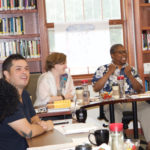The Wabash Center awards grants only for projects focused explicitly on issues related to teaching and learning theology and religion in higher education.
We receive many inquiries about worthy projects that we simply cannot fund because they fall outside the  parameters of our grants program. Therefore, we have compiled this list of other possible funding sources for higher education and related projects.
parameters of our grants program. Therefore, we have compiled this list of other possible funding sources for higher education and related projects.
There are far too many funding agencies for us to provide anything close to a comprehensive list — especially given the wide variety of possible topic areas. So our list begins by listing other lists of funding agencies.
The resources listed here focus on granting agencies that seem particularly applicable to likely Wabash Center web site visitors. But the world of granting institutions is vast and constantly shifting. Large segments of the granting world are missing from our very partial list, including: grants focused on ethnicity, race, or religious affiliation, most grants for area studies and most international grants (the list is oriented toward scholars in the United States and Canada). And we have not included grants that focus on community activism or language acquisition.
Latest Blog Posts
 Reading for Orpah: Rethinking the Bible’s Marginal Characters (Part One) - For the past several years, I’ve gotten obsessed with Orpah: Naomi’s other Moabite daughter-in-law in the biblical story of Ruth.[1] Often overshadowed by the story’s eponymous hero, Orpah can be […]
Reading for Orpah: Rethinking the Bible’s Marginal Characters (Part One) - For the past several years, I’ve gotten obsessed with Orpah: Naomi’s other Moabite daughter-in-law in the biblical story of Ruth.[1] Often overshadowed by the story’s eponymous hero, Orpah can be […] The Magic of Having Teachers - My last first day of class – as a student – was fifteen years ago. But here I am again, somehow back for more. I could make this into one […]
The Magic of Having Teachers - My last first day of class – as a student – was fifteen years ago. But here I am again, somehow back for more. I could make this into one […]